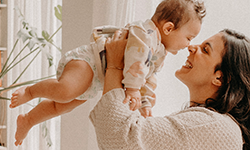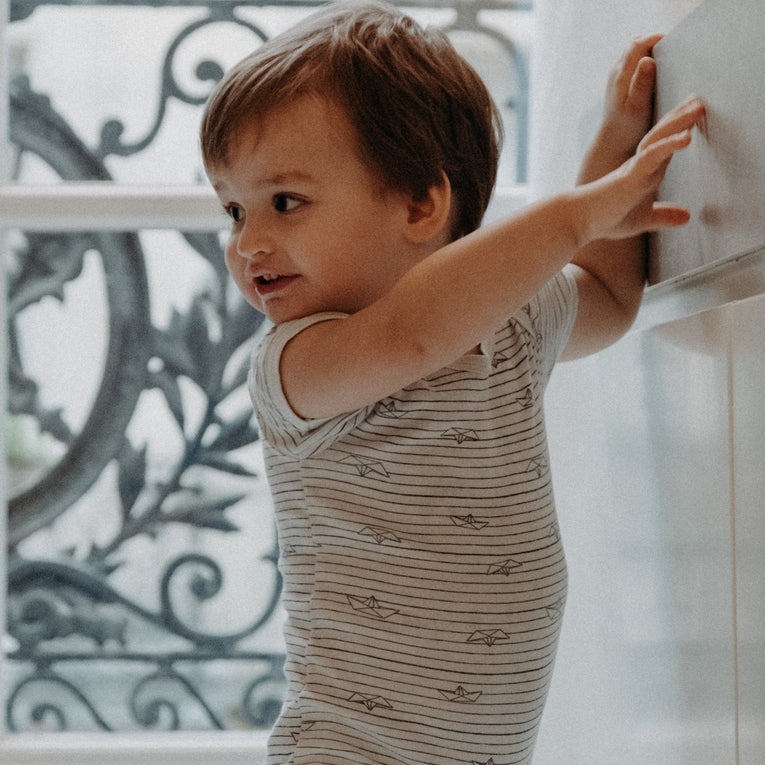How to Tell If Your Baby Is About to Start Walking
As Adeline explains:
"During their first year of life, babies go through a series of essential milestones leading up to their much-anticipated first steps. These preliminary stages occur in the following order:
- Rolling over
- Sitting up independently
- Crawling
"As your baby gets closer to walking, you’ll notice certain signs indicating they are on the verge of taking their first steps. Once you spot them, keep your camera ready—those first steps can happen overnight! Here are some signs that your baby is about to walk (and how to encourage them during this phase!)."
1. Baby Stands Up Alone Without Help
A baby cannot start walking until they have learned to stand up by themselves. "Generally, babies get ready to walk when they start standing up on their own or trying to pull themselves up," says Adeline.
Tip: Avoid baby walkers and other "support" devices that force babies into a standing position before they are naturally ready. Not only can these be dangerous, but they can also hinder walking development by encouraging improper foot and leg positioning. Trust the process and your baby’s natural progress!
To help them stand up on their own, allow your baby to use stable furniture, such as a couch, for support. This crucial milestone typically happens around 8 months, but it may take up to three more months before they take their first independent steps.
2. Baby Practices Standing Without Holding On
Once your baby learns to stand, they will start letting go—first with one hand, then with both—to test their balance. At first, they may only stay upright for a second or two before plopping down on their bottom (which is why learning to sit first is so important!). But this is a clear sign that walking is just around the corner.
As a parent, it’s natural to feel nervous when you see your child fall, especially if they shed a few tears. But don’t worry—it’s completely normal! Walking takes practice, and falling is part of the learning process.
3. Baby Takes Wobbly Steps While Holding Onto Objects
Your little one may take hesitant, shaky steps while gripping onto whatever they can find—a couch, a coffee table (now’s the time to baby-proof your home!).
Some babies cruise along furniture for months before walking independently, while others take off as soon as they stand. If you’re tempted to hold your baby’s hands to "help" them walk, Adeline advises against it:
"This can create an improper center of gravity and poor balance with their arms raised."
Instead, gently support your baby under their armpits using only your index fingers. A push-along walker can also be useful—but limit use to no more than 30 minutes per day.
4. Baby Becomes More Fidgety Right Before Walking
Remember the restless nights of teething? You might go through a similar phase just before your baby starts walking. Babies can become fidgety or cranky when they reach major developmental milestones. This could be due to the intense "brain work" happening as they prepare for their next big step.
A particularly challenging time? Mealtimes. Stay patient—this extra energy could mean your little one is about to start walking. And remember, this phase is temporary!
5. Sleep Disruptions Could Mean Walking Is Near
A baby’s sleep patterns change significantly during the first two years, especially when they hit a developmental milestone. Some babies sleep more than usual, while others experience multiple wake-ups when they previously slept through the night.
If your baby’s sleep has changed, it could be a sign that they are about to walk. However, if you have concerns, don’t hesitate to consult your pediatrician.
6. Baby Gains Confidence
Once your baby becomes comfortable pulling up and feels more stable, they will likely start testing their balance independently. They may begin moving from one piece of furniture to another or even using the walls for support.
Some babies jump right into walking, while others take their time. Confidence levels vary based on personality—an adventurous baby may take off quickly, while a more cautious one will wait until they feel secure.
Seeing your baby take their first steps is one of the most beautiful moments for any parent. But don’t stress if you hear comments like, "Your baby is a bit late." Walking follows a natural developmental process, and every baby moves at their own pace. If you have any concerns, speak with your pediatrician. In the meantime, be patient, encourage your baby as much as possible, and most importantly—make sure your home is safe for your little explorer!









